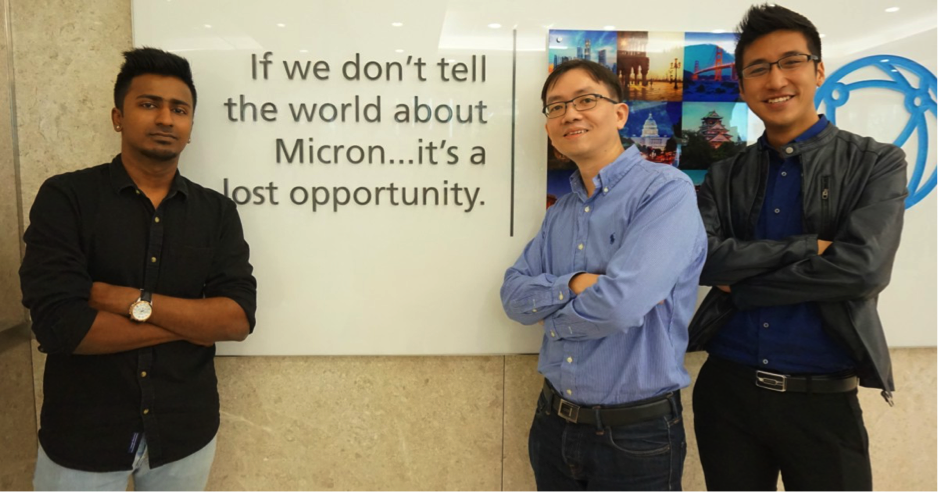Tell someone you work in engineering, and chances are, they think you work with grease and machines parts.
It is not an inaccurate picture, but with the perpetuation of tech-dominance, engineering has evolved into a career of the future.
Looking past the engineering of yesteryear, the engineering profession today touts the use of big data and high-end technology while working in impressive workspaces guaranteed to drop your jaws.
Engineering = Bulletproof Job of the Future?

The world today thrives on innovation. To maintain this inexorable forward thrust, the technology that supports cannot stagnate either. As such, the onus lies on engineers to not fall behind.
This is a harrowing thought indeed.
Micron data analyst Kegan Ang, who works with schematics, statistics and Big Data in the Planning Department (like a Central Command Centre), shared the perks of working for a company that provides extensive support for education.
Micron also partners with the local polytechnics to offer SkillsFuture Earn & Learn programmes for specialist diplomas. There are also in-house training programs that employees can participate in to up-skill themselves.

To job-seeking millennials out there, on-the-job education comes as an attractive incentive. Financial support aside, these perks also create a workspace that nurtures its staff, as opposed to utilising them as human robots to meet ends.
And if we’re talking about bulletproof jobs, working in a sector upon which the future relies (since the Internet of Things cannot work without memory cards, which Micron manufactures) sounds like a pretty stable gig indeed.
With an invite to Micron, I visited Fab 10, one of their 4 semiconductor facilities, to personally take a look at the workspace of a modern day engineer.
Micron Technology, Inc
Micron Technology Inc. is one of the wafer fabrication companies in Singapore which produces a global supply of memory chips (even the ones in your HPB tracker watch).
This U.S. multi-national giant employs approximately 7,500 workers in Singapore, and hires staff from various disciplines within Engineering.

In modern engineering, Kegan says that an engineer’s work is evolving into sophisticated, high tech work. So it’s not just about going out in the hot sun and getting sweaty and dirty.
For example, in Fab 10 clean rooms where memory chips are made, the room has to be free from random particles therefore, you cannot even tear paper in the room.
Engineers have to smock-up as the air in the Fab 10 floor is highly controlled for foreign particles.

To automate the transport of silicon wafers used to make memory chips, Front Opening Unified Pods (FOUPs) below are used.
Modern clean rooms are automated, with ceilings lined with tracks upon which the FOUPs travel.

Kegan’s job involves monitoring the progress of the automated processes, which means he not only has to know how the processes work, but also analyses how to improve production time, and troubleshoots where necessary.
A Space To Break The Rules

One aspect of engineering that used to put me off was the image of a ‘checklist’ work style, so imagine my surprise when I learnt about their “TED Talks”.
A platform for engineers to share ideas on how to improve systems, these talks also encourage engineers to trail-blaze new technology. Promising ideas are not swept under the rug and can actually be adapted and realised by the company.
For naysayers who think these conferences are limited to the more senior, scrap that thought. Kegan shared that despite being a new employee, he already had the chance to be on this stage of open-sharing (i.e. the “TED” talks) twice.

Engineering Is Vital To Singapore’s Future
In recent years, Singapore has been championing more opportunities for further education in engineering, such as via the Workforce Skills Qualifications (WSQ) for various engineering skills and the Electronics and Precision and Machinery Engineering Cluster’s Place-and-Train Programmes.

The Labour Movement has been expanding its U Associate network to include more than 40 professional guilds (termed U Associates) such as the Institution of Engineers, Singapore (IES), to develop training and progression opportunities for their professional members, such as the Engineers Progression pathway with a three-tiered scheme below.

But despite the increasing prominence of engineering as a career, I admit to still having harboured a skewed perception of what modern engineering was like, before hearing about modern engineering jobs from Micron and one of its engineers, Kegan Ang.
Trashing stereotypes of unattractive, dead-end work cultures, what I learnt that day truly showed me the future.
The Labour Movement is working closely with tripartite partners (i.e. the government and businesses) to help working people into future jobs, such as those in sunrise industries like engineering.
Also Read, 5 Harsh Realities Of Working In S’pore You Won’t Want To Hear But Should






